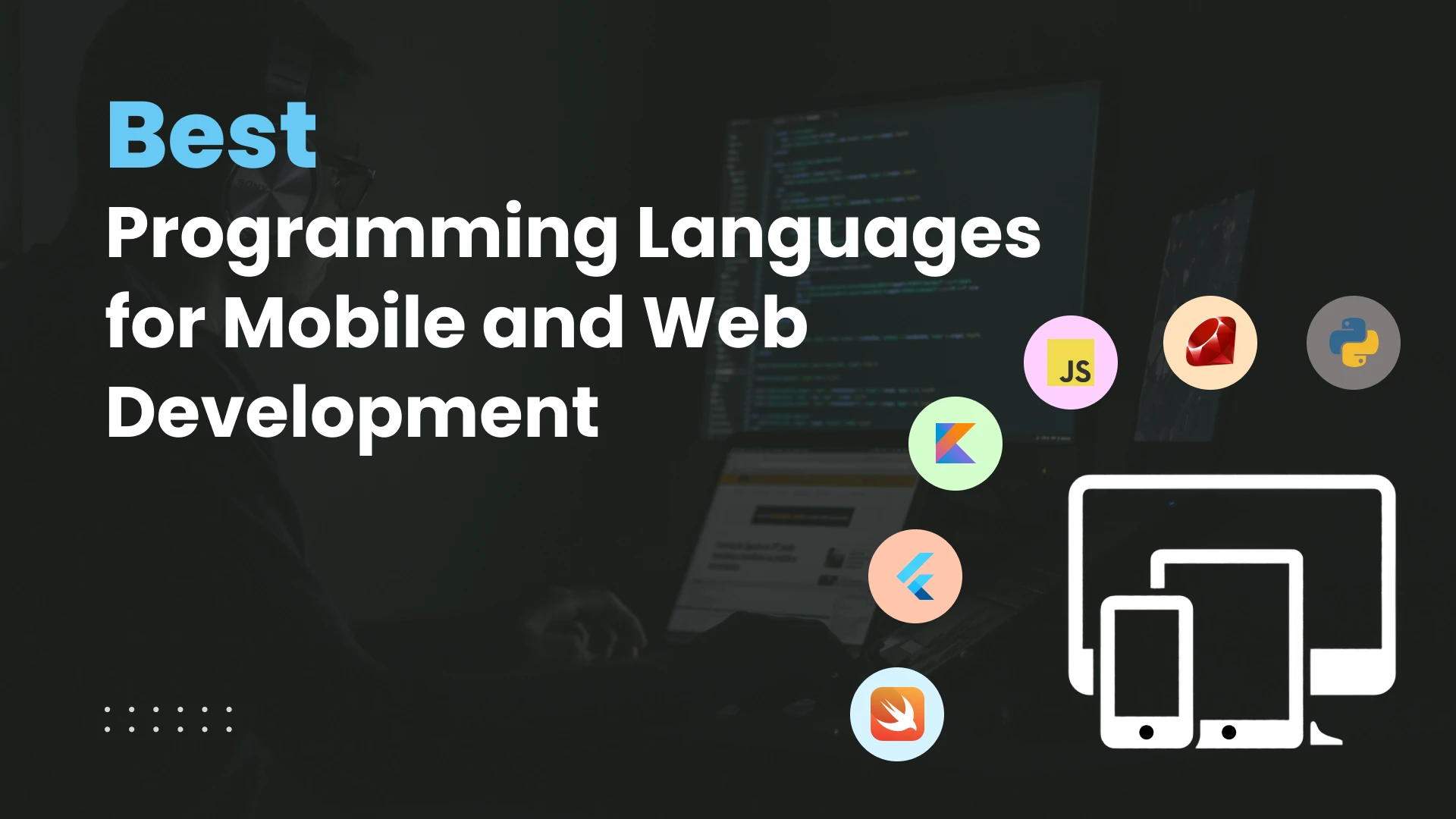Best Programming Languages in 2024 for Mobile and Web Development
In the rapidly evolving landscape of technology, choosing the correct programming language for mobile and web development is crucial for success. As we enter 2024, several programming languages have risen to prominence, each offering unique features and capabilities tailored to meet the demands of modern development. This blog explores the top programming languages for mobile and web development in 2024, highlighting their strengths, use cases, and prospects.
Best Programming Languages for Mobile Development:
In mobile development, selecting the correct programming language is crucial for building efficient, scalable, and feature-rich applications. Several languages have emerged as top contenders in 2024, each offering unique advantages and use cases:
-
Swift:
Developed by Apple, Swift is the preferred language for iOS app development. Known for its modern syntax and safety features, Swift enables developers to build robust and high-performance applications for iPhones, iPads, and other Apple devices. Its seamless interoperability with Objective-C allows for easy integration with existing iOS projects, making it an excellent choice for both new and legacy applications.
-
Kotlin:
Endorsed by Google for Android development, Kotlin has gained popularity for its concise syntax and advanced features. It offers null safety, extension functions, and seamless interoperability with Java, allowing developers to write safer and more maintainable code. Kotlin’s popularity stems from its ability to enhance productivity and streamline the Android development process, making it a favourite among Android developers worldwide.
-
Flutter:
Developed by Google, Flutter is a cross-platform UI toolkit that allows developers to build natively compiled applications for mobile, web, and desktop from a single codebase. Flutter’s reactive framework and customizable widgets enable developers to create stunning user interfaces that adapt seamlessly to different platforms and screen sizes. Its hot reload feature facilitates rapid iteration and real-time visualization of changes, making the development process faster and more efficient.
Best Programming Languages for Web Development
In web development, selecting the best programming language is crucial for building responsive, interactive, and scalable websites and web applications. Here are some of the top programming languages for web development, each with its unique strengths and use cases
-
JavaScript
JavaScript reigns supreme as the cornerstone of web development. Its versatility spans both frontend and backend development, powering dynamic and interactive user experiences. JavaScript frameworks like React.js, Angular, and Vue.js facilitate the creation of sophisticated single-page applications (SPAs) and user interfaces. Its asynchronous nature and event-driven architecture enable seamless handling of user interactions and data manipulation. Additionally, Node.js allows JavaScript to be used for server-side development, fostering a unified ecosystem for full-stack web development.
-
TypeScript
TypeScript, a superset of JavaScript, enhances web development with static typing and advanced tooling. By providing compile-time type checking, TypeScript helps catch errors early in the development process, improving code quality and maintainability. It seamlessly integrates with popular JavaScript frameworks like React and Angular, enabling developers to build large-scale web applications with confidence. TypeScript’s growing adoption underscores its effectiveness in enhancing developer productivity and scaling codebases.
-
Python
Python’s simplicity and readability make it a popular choice for web development, particularly with frameworks like Django and Flask. Django, a high-level web framework, simplifies the process of building web applications with features like ORM (Object-Relational Mapping) and built-in security mechanisms. Flask, a microframework, offers flexibility and minimalism, making it ideal for lightweight web applications and APIs. Python’s extensive ecosystem of libraries and frameworks further enhances its appeal for web development, enabling developers to prototype and deploy applications rapidly.
-
Ruby
Ruby on Rails, a web application framework written in Ruby, emphasizes convention over configuration and enables developers to build web applications rapidly. With features like scaffolding and ActiveRecord for database interactions, Ruby on Rails streamlines the development process. Ruby’s elegant syntax and focus on developer happiness have contributed to its popularity among startups and established companies alike. While its market share has declined in recent years, Ruby on Rails remains a viable option for web development projects that prioritize developer productivity.
-
PHP:
PHP is a server-side scripting language that powers a significant portion of the web, particularly content management systems (CMS) like WordPress and Drupal. Despite its detractors, PHP continues to evolve with modern features and frameworks like Laravel and Symfony, which promote best practices and security.
PHP’s widespread adoption and vast community make it an accessible choice for web developers of all levels.
Each of these programming languages has its strengths and use cases, catering to different project requirements, developer preferences, and industry trends. Ultimately, the best programming language for web development depends on factors such as project scope, team expertise, performance requirements, and long-term maintainability.
Future Outlook:
The future of programming languages in mobile and web development is poised for innovation and adaptation. As emerging technologies like AI, AR/VR, and quantum computing gain prominence, the right technology stack for web and mobile app development will be crucial. Language preferences are likely to shift towards those that seamlessly integrate with these advancements. For instance, languages with solid support for machine learning and data analysis, such as Python and Swift, may see increased adoption in mobile development for AI-powered applications. Similarly, the rise of augmented and virtual reality technologies may elevate the demand for languages that excel in creating immersive experiences, such as JavaScript and C#. As developers navigate this evolving landscape, selecting the right technology stack will be essential to harnessing the full potential of these emerging technologies and delivering cutting-edge solutions to users.
Conclusion:
In conclusion, selecting the best programming languages for mobile and web development in 2024 requires careful consideration of various factors such as performance, community support, and prospects. While established languages like JavaScript and Python continue to dominate, newer entrants like Swift, Kotlin, and Rust are gaining traction for their innovative features and capabilities. As technology continues to evolve, developers must stay updated with the latest trends and advancements to remain competitive in the dynamic field of software development.

















